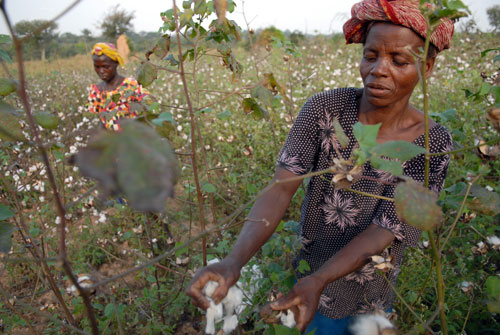China looks to Africa for an alternative source of cotton
Updated: 2011-12-16 15:40
By Zhou Siyu (China Daily)
|
|||||||||||
BEIJING - China is doing more to promote and develop its cotton-planting operation in four African countries, the Ministry of Commerce said on its website on Thursday.
|
 |
|
China will provide seeds, machinery, fertilizer and other materials to help promote cotton planting in Benin, Mali, Chad and Burkina Faso. N[Photo/Bloomberg] |
Experts and analysts said the move will help to strengthen ties between China, Benin, Mali, Chad and Burkina Faso. It will also allow the cotton trade to take place under fairer conditions in accordance with the World Trade Organization's (WTO) framework.
According to the statement, China will provide seeds, machinery, fertilizer and other materials to help promote cotton planting in the African countries.
Various programs will also provide training for technical and management personnel in both China and Africa, where companies will be encouraged to cooperate, innovate and improve their production capabilities in the textile industry, the ministry said.
The cotton trade does much to reduce poverty in a number of African countries. To boost their economic growth, many of these countries have adopted reforms meant to improve the quality of the cotton and make them more effective competitors in the international market.
Those efforts, though, have been frustrated by the hefty cotton subsidies that have been adopted in the United States and other countries, which are believed to have distorted world cotton prices, analysts say. In recent years, cotton subsidies have become a large hurdle in the Doha Round of talks now being conducted by the WTO.
The Doha Round, also known as the Doha Development Agenda, began in December 2001. One of its biggest goals is to make it easier for both developing countries and the least-developed countries to sell products in rich countries.
The talks have been often suspended in the past 10 years, often at times when the US, the EU, India, Brazil, China or other large players have been unable to agree on what rules should govern the agricultural industrial and services sectors.
The Commerce Minister Chen Deming said China understands the needs of African countries.
"China's market is always open to African countries," he said.
The recent cooperation between China and the African countries has been one of the best declarations against trade protectionism, especially as the Doha Round is at a standstill, according to Pascal Lamy, director-general of the WTO, when quoted in the ministry's statement.
"We have been providing African countries with aid and technical training for many years," said Du Min, director of the Chinese Ministry of Agriculture's research center for rural economy.
"Further cooperation will help to improve their production capacity.
"China's decision is promoting fair cotton trade in the world. African economies will benefit from the cooperation."
The closer ties may also help to secure another source of cotton for China, which imports and consumes more of the fiber than any other country in the world.
But it may take time for the African countries to improve their production capacity and export more cotton to China. So far, "the US and India remain the largest cotton exporters to China", said Gao Fang, executive vice-president of the China Cotton Association.
During the first 11 months of 2011, China's cotton imports increased by 8.4 percent from the same period a year ago, increasing to 2.57 million tons, according to data from the General Administration of Customs.








